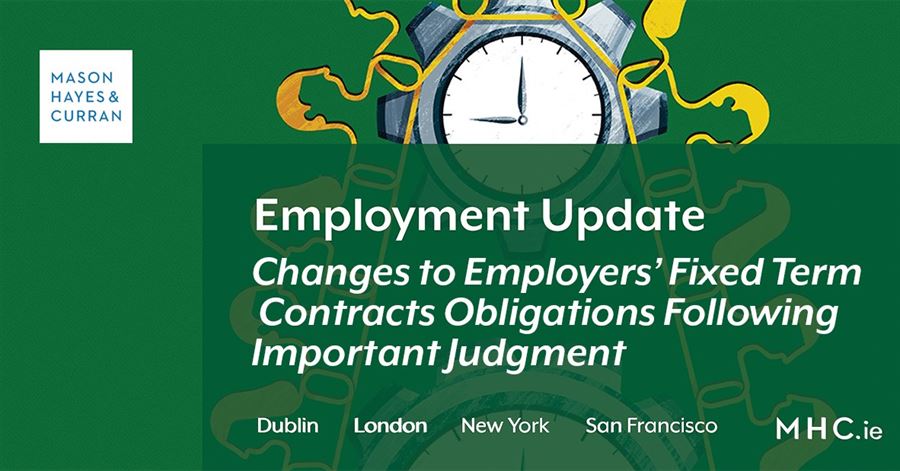Employment and Benefits Update: Changes to Employers’ Fixed Term Contracts Obligations Following Important Judgment

Background
A recent case before the High Court involved the Board of Management of Malahide Community School and a teacher. The teacher brought a claim for unfair dismissal against the school following the expiry of a fixed term contract without it being renewed.
![]() The four significant aspects of Mr Justice Garrett Simon’s judgment are:
The four significant aspects of Mr Justice Garrett Simon’s judgment are:
- A fixed term contract did not exist in the first place
- That prior informed consent is required for fixed term contracts
- That section 2(2)(b) of the Unfair Dismissals Act 1997 (the Act), is a waiver and not an exclusion, and
- That this waiver only applies at the commencement of an employment contract
We highlight the aspects of the judgment that employers need to be aware of.
No fixed term contract where contingencies are present
The fixed term contract contained two contingencies relating to its possible renewal; these related to hours and to satisfactory service.
Judge Simons held that by its nature a renewable contract was not certain and consequently could not be categorised as a fixed term contract.
This decision introduces the possibility that employees currently employed on fixed term contracts containing contingencies as to their possible renewal will claim that they were not in fact on fixed term contracts. They may also claim that their dismissal arising from the termination of the term of the contract is an unfair dismissal.
Informed consent is required for a waiver
Judge Simons held that a person cannot waive their rights if they have not been adequately advised and made an informed decision to do so. In this case the employee had acquired permanent status having been employed by the school, without a written contract, for two years prior to accepting a fixed term contract. Judge Simons was concerned that the employee in this case would lose her acquired right to permanence on signing the fixed term contract. This is a major change which has implications for the public sector. Fixed term contracts are used extensively in the public sector to avoid making permanent appointments. There is now a question mark over any fixed term contract containing contingent terms about its possible renewal as to whether it is a fixed term contract at all and/or whether the employee concerned might have acquired rights to permanence.
It is important for employers to ensure that any existing employees who enter into a fixed term contract obtain independent advice before signing their contract to this effect. Decisions of both the High Court and the Labour Court have previously held that legal or union advice, depending on the nature of the contract, is sufficient and fulfils the independent legal advice requirement.
Waiver exists at the commencement of a contract
Judge Simons re-classified section 2(2)(b) of the Act as a waiver and not an exclusion.
The timing of a waiver is of crucial importance. Judge Simons held that for a waiver to be valid, prior informed consent must be obtained in advance. He emphasised that it applied “at the commencement of employment”. A waiver cannot be retrospective.
Conclusion
This decision applies only when an existing employee is offered and accepts a new fixed term contract by their employer. Such a scenario is more likely to occur in the public than in the private sector.
A positive outcome of this decision for employers is that this judgment will reduce their risk. Once an employee has obtained informed consent and signed their fixed term contract, the employer will no longer be vulnerable to claims of abuse of section 13 of the Act.
We advise employers to ensure that existing full and part-time staff starting new fixed term contracts obtain independent advice before signing the contract.
If you would like to discuss the potential impact of this decision, please contact a member of our Employment & Benefits team.
The content of this article is provided for information purposes only and does not constitute legal or other advice.
Share this:




